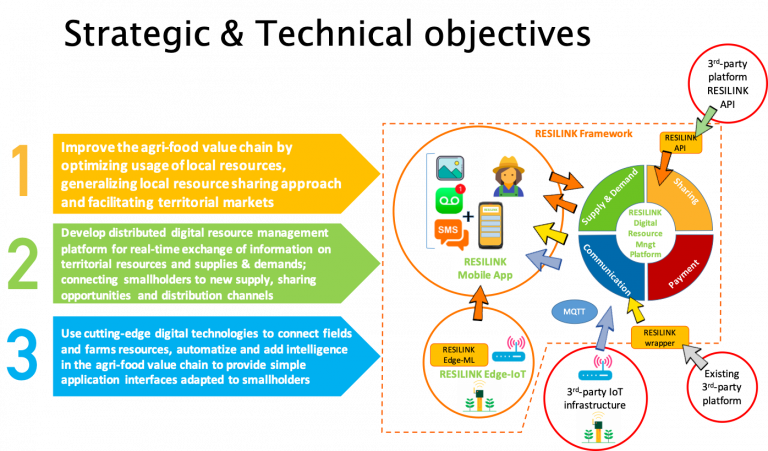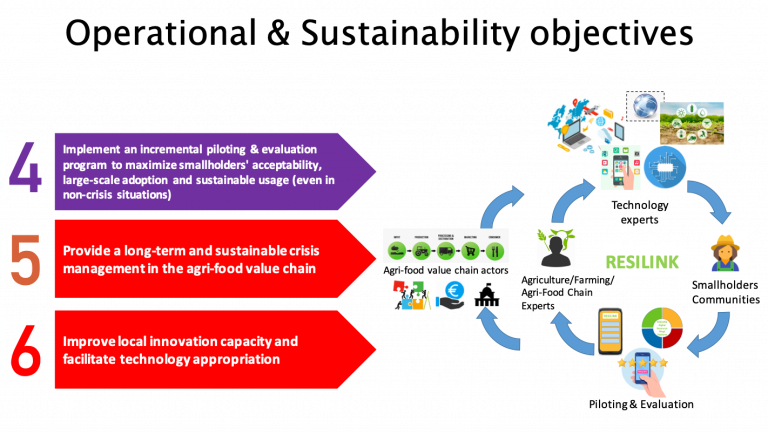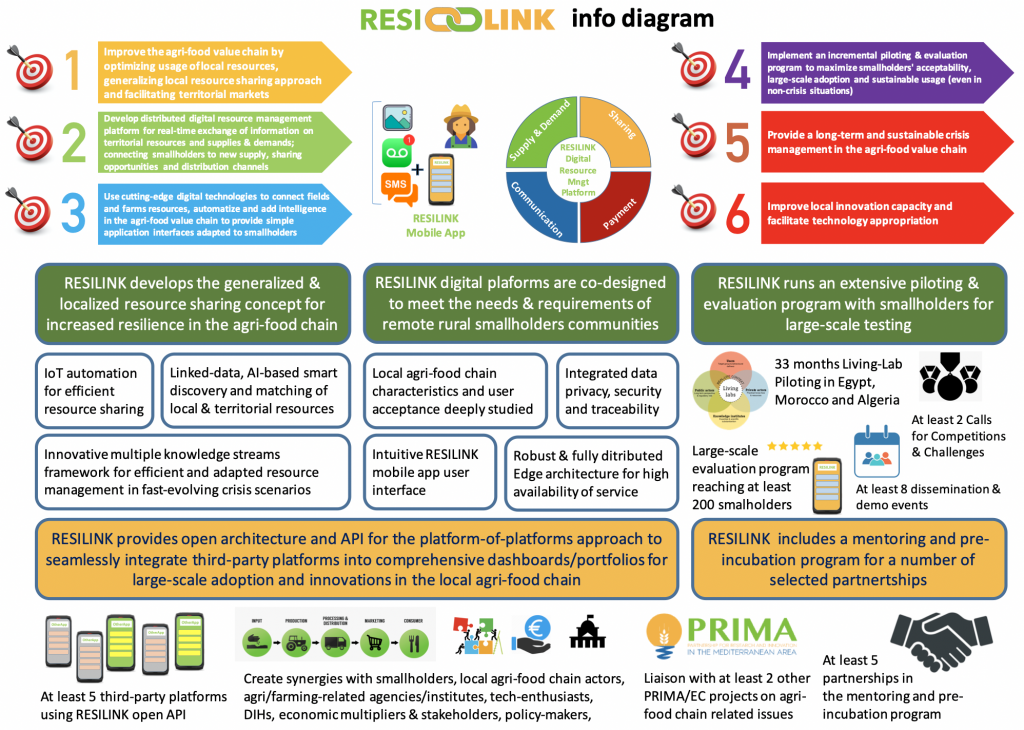RESILINK’s main objectives are summarized in the following illustration.



Improve the agri-food value chain by optimizing usage of local resources, generalizing local resource sharing approach and facilitating territorial markets. This strategic objective is to increase smallholder’s resilience by providing continuity of access to both resources and markets in crisis situations. This continuity will be achieved by promoting and linking local and localized usage of resources that are less impacted by restrictions on movements. By shortening the distribution channel for both inputs (e.g. agriculture/farming supplies from providers/distributors) and outputs (e.g. agriculture/farming productions to buyers/markets) the agri-food value chain will be less impacted by crisis situations. In addition, RESILINK will promote and generalize local resources sharing between smallholders at both food production as well as food transformation levels such as harvest and/or post-harvest equipment/machinery and logistics (e.g. tractors, storage rooms, chilling machines, drying machines, etc.) avoiding smallholders to entirely rely on external services that may become unavailable in crisis situations.

Develop distributed digital resource management platform for real-time exchange of information on territorial resources and supplies & demands; connecting smallholders to new supply, sharing opportunities and distribution channels. Objective 2 will be realized using advanced digital technologies and state-of-the-art architectures & protocols for flexible & real-time information exchanges. At users’ end, mobile applications will be developed for smallholders and will be the main interface to simply, quickly and intuitively interact with the RESILINK digital resource management platform. In order to be adapted to the smallholder communities, simpler interaction methods can also be supported such as SMS, voice attachment, pictures, etc. In line with the localized resource approach, the digital resource management platform that will be designed & developed in the project can be installed on light-weight local servers/cloud hosted at regional or city-level or even at the community level by socio-economic organizations such as Chambers of Commerce, cooperatives, government agencies, start-ups/SMEs… The platform can be installed in a distributed way, so that several platforms can operate simultaneously to manage resources according to geographical areas. Each of the distributed platforms can share the information on territorial resources.

Use cutting-edge digital technologies to connect fields and farms resources, automatize and add intelligence in the agri-food value chain to provide simple application interfaces adapted to smallholders. Smallholders will interact only in a very simple manner with the digital resource management platform, indicating available resources and offered resources. Based on previous experience gained from more than 6 years of international collaborations with smallholders in both North and Sub-Saharan African countries, we know that acceptability and usage can be low if the proposed interface is too complex. In RESILINK, while inputs from end-users are kept simple, cutting-edge digital technologies in IoT, Linked Data, DSS and AI will be designed to provide advanced features to efficiently connect smallholders to resources, matching demands to offers in an intelligent manner. For instance, simple IoT devices (such as push buttons, tags readers, QR code, environmental sensors, and field sensors) deployed for specific tasks can automatize a number of simple processes. Then, Linked Data and DSS integrated into low-cost and compact IoT edge gateways can process multiple knowledge streams to efficiently notify smallholders (alarm, SMS,…) on relevant events such as availability of resources, request for resources, localization of resources, etc.

Provide a long-term and sustainable crisis management in the agri-food value chain. The objective is to propose a unique interface to maximize the re-utilization and the integration of existing and future platforms, as well as showing a simplified and unique interface to smallholders. RESILINK will design and propose an architecture with its associated Application Programming Interface (API) for the development of new resource sharing platforms to provide interoperability; and will develop software wrappers for the integration of existing platforms. Based on the Publish-Subscribe model, RESILINK will target flexible information exchanges between software components and various digital platforms as well as facilitating automatic matching between demands and offers with intelligent methods.

Implement an incremental piloting & evaluation program to maximize smallholders’ acceptability, large-scale adoption and sustainable usage (even in non-crisis situations). As the main objective of RESILINK is to promote and link local and localized usage of resources, it can represent a major change in smallholder’s mentality and practice compared to the traditional agri-food chain. This objective is therefore to maximize smallholder’s acceptability of these new technologies that may imply radically new practices for smallholders.
RESILINK proposes several digital components as described by Objective 2. The most visible to smallholders will be the mobile application for sharing information. The sharing principle and the user interface, which is crucial for user’s acceptability, will be extensively tested in the piloting program following the “Living-Lab” methodology where daily usage of the sharing concept will be studied for more than 2 years.
As RESILINK also proposes advanced features using cutting-edge digital technologies that will be incrementally introduced – IoT automation then DSS and AI, see Objective 3 – at each step, acceptability will be carefully studied and discussed. Demonstrators will be developed and tested in the piloting program where participating smallholders will be able to get support and provide feedback.

Improve local innovation capacity and facilitate technology appropriation. RESILINK will develop the digital intelligent resource management platform in open-source with an extensive public API to maximize re-utilisation and facilitate the integration of new platforms. Local developers can build specialized platforms for specific resources (e.g. sharing of drying machines along with its specific business model) and use the public API to link their platforms with the RESILINK framework in order to benefit from the global intelligent resource sharing and management system in addition to quickly reach the already existing smallholder community. To facilitate technology appropriation, all source codes with documentation and tutorial materials will be made available on the RESILINK GitHub code repository. RESILINK will organize technology training sessions to present the generalized resource sharing approach, the RESILINK platform and the RESILINK API to tech & developer communities.
* * *
The following info diagram depicts the project’s approach to raise awareness, promote generalized sharing of localized resources, increase local innovation capacity and target large-scale adoption of RESILINK’s digital platform.
